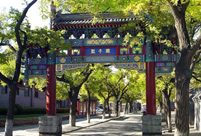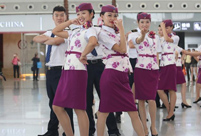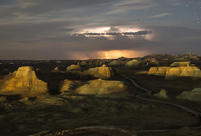 Global ambassadors of ecotourism gather in Nanjing
Global ambassadors of ecotourism gather in Nanjing
 Taiwan woman marries into Kazak family, 100 sheep plus a flat as dowry
Taiwan woman marries into Kazak family, 100 sheep plus a flat as dowry
 College girls take graduation photos under water in Chongqing
College girls take graduation photos under water in Chongqing
 Cartoon: Xi and football
Cartoon: Xi and football
 Chinese influence sweeps ROK
Chinese influence sweeps ROK
 Post-90s beauty boxer grapples four men
Post-90s beauty boxer grapples four men
 3,000-year-old tea town through lenses
3,000-year-old tea town through lenses
 22 archaeological sites along Silk Road in China
22 archaeological sites along Silk Road in China
 Football babies, Samba dancers embrace 'World Cup'
Football babies, Samba dancers embrace 'World Cup'
 Beautiful scenery along China’s Grand Canal
Beautiful scenery along China’s Grand Canal
URUMQI, July 5 -- While the whole world was watchingthe Germany-France FIFA World Cup game in the early hours ofSaturday morning, people in Urumqi were more concerned about whatmight happen at daybreak.
On the same date of 2009, nearly 200 people were killed andanother 1,700 injured in fatal rioting that broke out in the city,capital of Xinjiang Uygur Autonomous Region in northwest China.
Terrorism has ever since become an outstanding matter in Urumqi,as fatal attacks have never ceased. Hard-line actions have beencarried out in the city, as an effort to secure stability andcombat terrorism.
A terrorist attack on a downtown open-air market on May 22 left31 people dead and 94 others injured. According to the citygovernment, it is impossible to eliminate potential security risksat such cramped and crowded venues.
The city has tightened security checks to the highest level atairports, railway and bus stations, shopping malls, schools andkindergartens. One has to go through a body scanner before enteringa public square or park.
"We are getting used to it and totally understand thecomplication. After all, we are a part of the city and have toaccept what is going on in front of us," said Chen Huaming, aUrumqi retiree.
In another attack in the city on April 30, three people werekilled and 79 injured at a railway station. Local authorities havestepped up controls on the mobile population, rental homes andhotels.
"Though it is tough, we are trying to lead a life as normal asbefore," said a supermarket cashier wearing a bulletproof vest.
Terrorist attacks carried out by separatists and extremists fromXinjiang have also become more frequent outside of the region. Astring of violent attacks including one at a train station in thesouthwestern city of Kunming this March and another at TiananmenSquare in Beijing last October have frightened tourists away fromvisiting Xinjiang, a region with incomparably abundant tourismresources.
"You never know how calm and safe it is in Xinjiang until youreally visit it," said Yang Guang, a tourist from Shanghai whocould not resist the temptation of rock-bottom hotel prices and anair ticket sold at a discount of 70 percent.
"Local Han people are no different to us while Uygurs are morewelcoming and enthusiastic than you think," Yang added.
Out of an approximate 20 million population in Xinjiang, Hanpeople account for about eight million and the rest are mainlycomposed of Uygur and other ethnic minorities.
Like most backpackers, Yang took many pictures of local food andscenery and posted them on his WeChat account. The convenient andubiquitous WiFi access in today's Xinjiang contrasts with theInternet-free 10 months in the wake of the 2009 riot.
"We have been there -- having no access to the outside world andjust sitting there doing nothing, so we cherish the currentInternet access more than anyone," said a Urumqi resident.
However, for those who run businesses in the city's GrandBazaar, which was the epicenter of the rioting, a sharp drop incustomer flow has hit them hard.
"I used to receive over 200 customers with an average spend of500 yuan (80 U.S. dollars) a day, but now I have almost nocustomers and a meager turnover," said Gulnar, a Uygur shopowner.
But she is confident about the future. "No one feels insecure orthreatened here. I believe tourism in Xinjiang will pick up, so Icome to open the shop early every day," Gulnar said. Enditem
 Featured hutongs in Beijing
Featured hutongs in Beijing Separate college entrance exam
Separate college entrance exam Flash mob dance
Flash mob dance Picturesque scenery of Ghost City
Picturesque scenery of Ghost City Children attend First Writing Ceremony
Children attend First Writing Ceremony Female master poses for graduation photos with son
Female master poses for graduation photos with son Silk Road, China's Grand Canal listed as World Heritage Sites
Silk Road, China's Grand Canal listed as World Heritage Sites PKU students imitate famous paintings in real-person photos
PKU students imitate famous paintings in real-person photos Chinese 'Slumdog Millionaire'
Chinese 'Slumdog Millionaire' Islands in S. China Sea better shown on new vertical atlas of China
Islands in S. China Sea better shown on new vertical atlas of China Girl takes father’s portrait to travel the world
Girl takes father’s portrait to travel the world Images of Xi'an: Part one
Images of Xi'an: Part one In Pictures: Female fans of World Cup
In Pictures: Female fans of World Cup Top 20 hottest women in the world in 2014
Top 20 hottest women in the world in 2014  China's top 10 representative architectures
China's top 10 representative architecturesDay|Week|Month